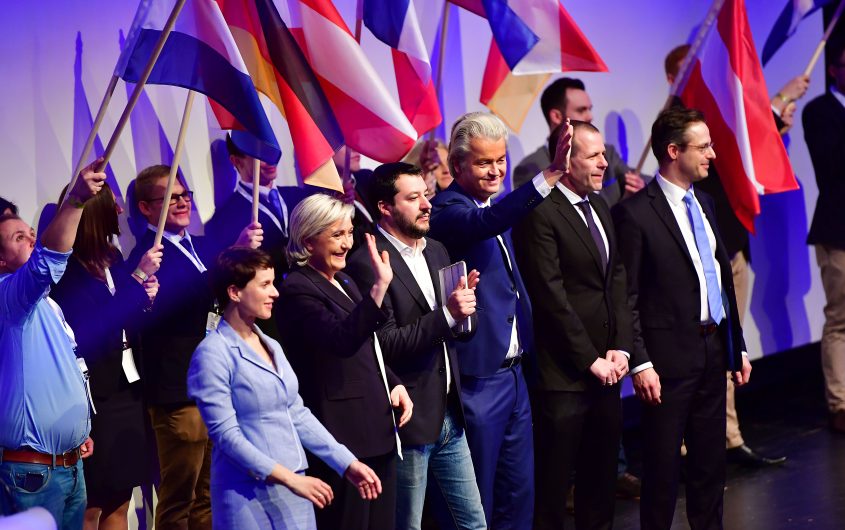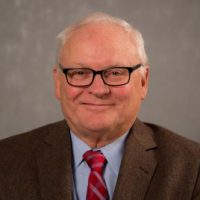
Thomas Lohnes/Getty Images
Populist Wild Fires are Spreading – Why Now?

Jackson Janes
President Emeritus of AGI
Jackson Janes is the President Emeritus of the American-German Institute at the Johns Hopkins University in Washington, DC, where he has been affiliated since 1989.
Dr. Janes has been engaged in German-American affairs in numerous capacities over many years. He has studied and taught in German universities in Freiburg, Giessen and Tübingen. He was the Director of the German-American Institute in Tübingen (1977-1980) and then directed the European office of The German Marshall Fund of the United States in Bonn (1980-1985). Before joining AICGS, he served as Director of Program Development at the University Center for International Studies at the University of Pittsburgh (1986-1988). He was also Chair of the German Speaking Areas in Europe Program at the Foreign Service Institute in Washington, DC, from 1999-2000 and is Honorary President of the International Association for the Study of German Politics .
Dr. Janes is a member of the Council on Foreign Relations, the International Institute for Strategic Studies, the Atlantic Council of the United States, and American Purpose. He serves on the advisory boards of the Berlin office of the American Jewish Committee, and the Beirat der Zeitschrift für Außen- und Sicherheitspolitik (ZfAS). He serves on the Selection Committee for the Bundeskanzler Fellowships for the Alexander von Humboldt Foundation.
Dr. Janes has lectured throughout Europe and the United States and has published extensively on issues dealing with Germany, German-American relations, and transatlantic affairs. In addition to regular commentary given to European and American news radio, he has appeared on CBS, CNN, C-SPAN, PBS, CBC, and is a frequent commentator on German television. Dr. Janes is listed in Who’s Who in America and Who’s Who in Education.
In 2005, Dr. Janes was awarded the Officer’s Cross of the Order of Merit of the Federal Republic of Germany, Germany’s highest civilian award.
Education:
Ph.D., International Relations, Claremont Graduate School, Claremont, California
M.A., Divinity School, University of Chicago
B.A., Sociology, Colgate University
Expertise:
Transatlantic relations, German-American relations, domestic German politics, German-EU relations, transatlantic affairs.
__

Stephen F. Szabo
Senior Fellow
Dr. Stephen F. Szabo is a Senior Fellow at AICGS, where he focuses on German foreign and security policies and the new German role in Europe and beyond. Until June 1, he was the Executive Director of the Transatlantic Academy, a Washington, DC, based forum for research and dialogue between scholars, policy experts, and authors from both sides of the Atlantic. Prior to joining the German Marshall Fund in 2007, Dr. Szabo was Interim Dean and Associate Dean for Academic Affairs and taught European Studies at The Paul H. Nitze School of Advanced International Studies, Johns Hopkins University. He served as Professor of National Security Affairs at the National War College, National Defense University (1982-1990). He received his PhD in Political Science from Georgetown University and has been a fellow with the Alexander von Humboldt Stiftung, the Woodrow Wilson International Center for Scholars, and the American Academy in Berlin, as well as serving as Research Director at AICGS. In addition to SAIS, he has taught at the Hertie School of Governance, Georgetown University, George Washington University, and the University of Virginia. He has published widely on European and German politics and foreign policies, including. The Successor Generation: International Perspectives of Postwar Europeans, The Diplomacy of German Unification, Parting Ways: The Crisis in the German-American Relationship, and Germany, Russia and the Rise of Geo-Economics.
Why now? Why are far-right populist wild fires continuing to spread in the U.S. and Europe—and elsewhere around the globe? The latest versions in Europe are a landslide victory of Viktor Orbán in Hungary on April 8 following the Italian elections on March 4 that catapulted the populist Five Star Party into the parliament as its second largest presence.
In search for explanations, there are several recent books assessing both cause and effect of these developments. One of them was written by Yascha Mounk, whose “The People vs Democracy: Why Our Freedom Is in Danger and How to Save It” was a recent topic of conversation at AGI in the presence of the author himself.
The argument Mounk makes about the dangers to freedom is the impact of populism on liberal democracy. Mounk says that the balance between individual rights and the process of participation in a democracy—the equation for a successful liberal democracy—is wobbling. He refers to the alternative of illiberal democracies emerging in which people can participate but have curtailed individual rights. The alternate version he describes is the majoritarian illiberal regimes which can emerge as largely unresponsive to minorities. Both trends are a danger to freedom. And looking across the political horizon there are worrisome trends which some describe as marking a democratic recession.
The scene of this development is set with multiple causes. Where people are increasingly anxious and frustrated by their environments, for economic reasons or due to perceptions of cultural change, they are attracted to populist movements as a vehicle of protest against institutions, governing elites, or societal threats. That opens the doors to populist figures be they in Europe, Asia, or the United States. Drawing on the anxieties and fears about the future, these figures present themselves as those who can deliver protection as well as fix the problems.
What are the tools of these populist movement? While each country may have its own mix of causes, the primary drivers as identified by Mounk include a static economic status as well as changes that threaten identity amid increasing ethnic or racial diversity. Another more recent factor is the role of social media, which generates the capacity of both populist leaders and followers to create echo chambers for themselves to identify enemies as well as allies under their proclaimed tribal flag.
The ability to confront the populist challenges by addressing social and economic divisions and handicaps can best succeed if there is a sense of ownership in the society at large. How inclusive that identity can be—regardless of race, ethnicity, or other factors shaping a commonweal—will depend on how well the institutions and the individuals charged with being accountable for them can perform. The roots of the populist backlash today are to a large extent a result of recent developments, such as a spike in immigration or flat line economic growth. But they can also be drawn from the past, such as nationalist fervor which can be used to set the boundary lines of a tribe or a country by those in power. By calling on a particular interpretation of a narrative, the limits and possibilities of membership within boundaries are determined.
There are clear trends toward a revitalization of nationalist identity on both sides of the Atlantic. Whether it be the Brexit vote in the UK, the “Make America Great Again” rhetoric in Washington, or the proliferation of populist movements in Europe, the increase in distrust in institutions, in the elites who govern them, in the media, and indeed in democratic systems in general is alarming.
Today the ability of liberal democracies to restore both trust and performance is being severely tested. The populist anger cannot be confronted with more anger, but certainly not with appeasement either. The better solution is to generate answers to real concerns with real policies.
Mounk suggests some of those policies which address the need for a more balanced approach to securing a quality of life, whether it be fair housing, portable medical care, continuing life-long education, and indeed a process for controlling national borders. But all of those efforts are part of addressing the restoration of hope in a more inclusive liberal democracy.
We have experienced the success of such systems of government during the past seven decades in Europe and the U.S. Was that period of time an exceptional moment in history? Is the shift of global power now changing the contours of the transatlantic community such that it cannot replicate these past decades with domestic reforms to keep pace with those changes? Edward Luce, the author of The Retreat of Western Liberalism, and who was also with us in our recent discussion, argues that the geopolitical context is important as we are witnessing a retreat of democracy on all continents. This is part of a larger shift of power from the West to the East. Or is it in danger of simply abdicating its role in shaping new conditions on a global scale? In the German case, the rise of the Alternative for Germany (AfD) raises the question: is the German glass half full or half empty? The vote for the extreme right in Germany was smaller than that in France or for Brexit—not to mention the Hungarian result. This is an impressive result given that this all took place after Germany took in over one million refugees. Germany still has a literate public and a limited impact of social media.
Mounk quotes an inspiring speech delivered by President Obama in Selma, Alabama, in 2015 to set the scene for the answer. In speaking about the American struggle with race relations, he said, “ What greater expression of faith in the American experiment than this; what greater form of patriotism is there; than the belief that America is not yet finished, that we are strong enough to be self-critical, that each successive generation can look upon our imperfections and decide that it is in our power to remake this nation to more closely align with our highest ideals?”
There is another citation from a speech by French president Emmanuel Macron during his 2017 election campaign that addresses populist trends. Macron told supporters, “When I look at Marseille, I see a French city shaped by two thousand years of history, of immigration, of Europe […] I see Armenians, Italians, Algerians, Moroccans, Tunisians. I see people from Mali, from Senegal, from the Ivory Coast. […] But what do I see? I see the people of Marseille! What do I see? I see the people of France! The people of France. […] They are here, They are proud. Proud of being French. Take a good look at them, Ladies and Gentlemen of the Front National: This is what it means to be proud to be French.”









